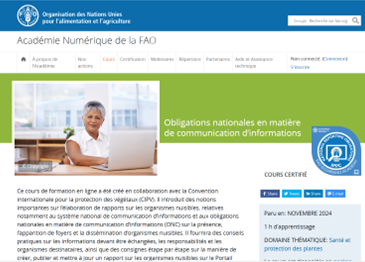Celebrating International Day of Education
Posted on Fri, 24 Jan 2025, 08:59

IPPC and FAO elearning Academy components involved in the creation of eLearning courses. © FAO/ Angelabenedetta Vangi
Learning, unlearning and relearning: How the IPPC supports continuous, innovative and inclusive learning for phytosanitary excellence
The global phytosanitary community is central to protecting plants, the environment and trade from pests. Plant pests and diseases cause 20-40 percent crop loss annually, leading to famine, ecosystem damage, and economic losses. Effective plant health work is thus crucial for securing our future, and continuous learning and innovation are critical to mitigating these challenges.
The International Plant Protection Convention (IPPC) is at the forefront of equipping plant health professionals worldwide with the knowledge and tools to combat pest threats effectively. To this end, the IPPC Secretariat provides freely available e-learning courses and resources to enhance phytosanitary knowledge and practice among plant health personnel and enthusiasts. The courses are developed in collaboration with international phytosanitary experts with a wealth of knowledge, practical expertise, and extensive understanding of plant health issues. In commemoration of the International Day of Education on January 24, we highlight the importance of innovative and inclusive, accessible and continuous plant health capacity development.
Empowering through knowledge sharing
The IPPC’s implementation and capacity development (ICD) resources such as e-learning courses, guides and training materials support phytosanitary officers by enhancing their understanding of International Standards for Phytosanitary Measures (ISPMs) and strengthening their skills and expertise for effective implementation. These materials equip personnel, especially new staff at national plant protection organizations (NPPOs), to contribute to international plant health efforts, especially in the context of global changes like climate change and increased international travel and trade.
“The IPPC learning resources meet high international standards and are intended to help countries elevate their ability to protect plant resources and global trade. The IPPC is grateful to all the global experts and professionals with whom we collaborate to develop these training resources and we celebrate them today”, said Sarah Brunel, Officer in Charge for day-to-day matters at the IPPC Secretariat and Team Lead of the Implementation and Facilitation Unit.
IPPC e-learning courses

The IPPC, in collaboration with the FAO eLearning Academy and Committee Linking Entrepreneurship, Agriculture and Development (COLEAD), offers IPPC e-learning courses, to enhance the knowledge and skills of phytosanitary officers. Development of these courses was funded by the European Union through the FAO support to COMESA trade facilitation programme.
Currently, there are five essential courses on Surveillance and Pest Status Determination, National Reporting Obligations, Pest Risk Analysis, Phytosanitary Export Certification, and Inspection. These self-paced courses are free and available anytime and anywhere, in English and French, with more translations expected in 2025. Upon completion of the courses, the learner receives a certificate of competencies also referred to as a digital badge, attesting the achievement of the learner. As of January 2025, more than 4 600 leaners worldwide, including plant health officers have taken the IPPC learning courses and more phytosanitary officers worldwide are encouraged to take the courses.
The IPPC and FAO eLearning Academy have enhanced collaboration and are developing additional new courses such as Preparing a national phytosanitary capacity development strategy, emergency response, and several others, expected to be available in 2025.
“The FAO eLearning Academy is proud to offer the IPPC eLearning courses and collaborate with the IPPC to implement and host the IPPC Plant Health Campus. This pioneering project, featuring all IPPC e-learning courses, will surely inspire other FAO technical divisions to strengthen capacity development through innovative eLearning”, said Christina Petracchi, Head of the FAO eLearning Academy. “The Academy has over one million learners worldwide, and we are pleased to contribute to empowering phytosanitary professionals. We are committed to creating more freely accessible courses, promoting the transfer of competencies, expertise development and innovation” she added.
“The IPPC e-learning courses have profoundly enhanced my understanding of critical phytosanitary concepts, which I was able to apply practically during the Phytosanitary Capacity Evaluation (PCE) implementation in Zimbabwe. The knowledge I gained from the IPPC e-learning courses has been invaluable in my duties within the NPPO of Zambia and in understanding the ISPMs” said Justina Chivanga, Head of Standards and Regulations Unit, Department of Plant Quarantine and Phytosanitary Service, Zambia, in a recent interview with the IPPC.
New: IPPC Plant Health Campus coming up
In 2025, the IPPC and partners will launch the IPPC Plant Health Campus, a novel initiative providing high-quality training resources for NPPOs to enhance their national-level phytosanitary training programmes on all relevant phytosanitary components. It will serve as a one-stop portal for all IPPC ICD materials, developed in response to growing plant health capacity development needs, particularly in developing countries. Participants will receive practical virtual training to empower them to implement international plant health standards and facilitate safe trade. The Campus, developed and hosted by the FAO eLearning Academy, aims to improve on-the-job training in phytosanitary issues and help NPPOs work towards greater consistency in the harmonization of measures for implementing ISPMs. The IPPC Plant Health Campus along with the new eLearning courses, are being developed through the European Union-funded project Strengthening food control and phytosanitary capacities and governance. The Governments of Canada and the Republic of Korea will also provide financial support for the development of the IPPC Plant Health Campus.

